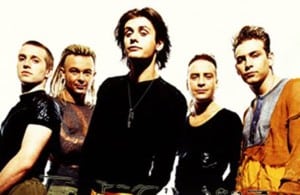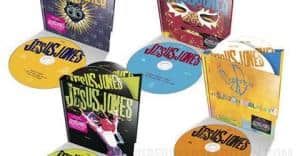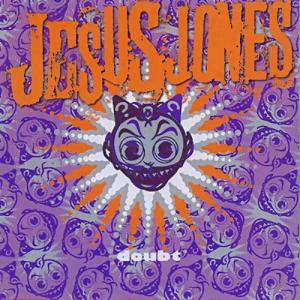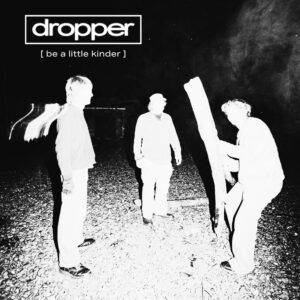Jesus Jones: Right Here, Again (Interview)
Jesus Jones will return to Auckland after more than 20 years to perform their chart-topping album, Doubt, in its entirety. The band, led by front man Mike Edwards, is still made up of the same five musicians who recorded the album back in 1991. That record featured the hit single Right Here, Right Now, a song that would later be recorded by The Feelers and used as an anthem for the 2011 Rugby World Cup. Although Jesus Jones haven’t released any new music for a decade, they’ve been busy shoring up their legacy with an extensive reissue program. The 13th Floor’s Marty Duda spoke with Mike Edwards about the band’s longevity and why their 1991 Auckland show was memorable for all of the wrong reasons.
Click here to listen to the interview with Mike Edwards of Jesus Jones:
Or, read a transcription of the interview here:
MD: First of all, you’re gonna be here in a few months and I know you’ve been to Australia before, Have you been to New Zealand before, performing?
ME: Only once actually, yeah. We did just the one show in Auckland obviously setting the pattern for future tours. That was in 1991.
MD: Right.
ME: Not only that, I should say at this point we were not particularly impressed with ourselves and the performance we delivered on that occasion. So there’s a kind of grudge rematch thing going on here, we feel we owe it to the fans of the band in New Zealand to actually come over and do a decent show this time. So the pressure’s on and we’re up for it.
MD: What happened to the first one?
ME: Well, it’s just the law of averages more than anything else. If you do 40 shows then one or two of them aren’t gonna be as good as the others. But there’s also, I think there’s a logistical element, we were on the back of a 6 week U.S tour, which was not our first tour of the year either.
MD: Right.
 ME: So we finished in, I think it was Seattle, something like that, and then we flew from Seattle via Hawaii, a quick stop over in Hawaii to New Zealand. We got in there at 9am, I think the interviews started at something like 11am, 2 hours later, it went on all day. We did the gig, I believe it was the next day, we were just shot to bits, so tired, and under a huge amount of pressure, particularly since this was the only gig that we had, you know, there was a lot of expectations on our behalf as well as the audience and I just don’t think the conditions were right for doing a decent show.
ME: So we finished in, I think it was Seattle, something like that, and then we flew from Seattle via Hawaii, a quick stop over in Hawaii to New Zealand. We got in there at 9am, I think the interviews started at something like 11am, 2 hours later, it went on all day. We did the gig, I believe it was the next day, we were just shot to bits, so tired, and under a huge amount of pressure, particularly since this was the only gig that we had, you know, there was a lot of expectations on our behalf as well as the audience and I just don’t think the conditions were right for doing a decent show.
MD: Sounds like it, yeah.
ME: I think it’s not gonna be easy this time, you know, someone’s put New Zealand on the other side of the world, but nonetheless. It is a different scenario, we do it for fun these days whereas previously, you know, we went somewhere because you had to do it and that was the schedule and people expected a lot from us. I think these days people just wanna have a good time when they come and see us and that makes a much more conducive environment, I think.
MD: Gotcha. I’m surprised that you could remember all those details from 1991 especially with all the shows you’ve done.
ME: Well I mean, the thing is, had you said have you played in Chicago before I would have said yes so many times I can’t remember but if you do the one gig in Auckland and it doesn’t go well then you remember that kind of thing.
MD: I guess so, yeah. Fair enough. Are you familiar with the band The Feelers and the fact they used Right Here Right Now for the 2011 rugby world cup thing?
ME: Oh absolutely, yeah. Yeah I mean as a song writer when you get offered this kind of thing, when someone suggests that this kind of thing be done, the publishing company has to get in touch with you. So I was very aware of that and also, you know, the friends or contacts I have in New Zealand kind of let me know about that. I was very aware of it, yeah and can I just say at this point that I take as much credit as I possibly can for New Zealand’s success in that tournament.
MD: Excellent, that’s great. Now I know you’ve been working quite a bit this year on a reissue program, is that right?
 ME: Yeah, actually to be honest, to be honest about it, it’s more the keyboard player in the band, Iain. He’s now the band’s manager, has been for a few years, and he’s worked very, very hard on putting things together from a kind of fan point of view, he’s waded through hours and hours and hours of material, most of which I couldn’t bear to listen to, so I think he’s done pretty well there. But he’s come up with kind of a fan’s eye view of reissued material, stuff that people would really want to hear and surfaced in the comments and the Facebook comments and stuff like that. I think he’s done a very good job. So yeah, he’s done a lot of work on kind of bringing things up that I would have wanted buried.
ME: Yeah, actually to be honest, to be honest about it, it’s more the keyboard player in the band, Iain. He’s now the band’s manager, has been for a few years, and he’s worked very, very hard on putting things together from a kind of fan point of view, he’s waded through hours and hours and hours of material, most of which I couldn’t bear to listen to, so I think he’s done pretty well there. But he’s come up with kind of a fan’s eye view of reissued material, stuff that people would really want to hear and surfaced in the comments and the Facebook comments and stuff like that. I think he’s done a very good job. So yeah, he’s done a lot of work on kind of bringing things up that I would have wanted buried.
MD: And did you have any opportunity to kind of listen back to some of the stuff and give it, you know, another going over, you know, with 25 years in hindsight?
ME: No and cleverly, Iain didn’t allow me to do that, he just went ahead without me and that was probably the best approach. However, there was a tie-in actually to the tour that we’re doing because we get to New Zealand and straight on to Australia afterwards. We’re playing Doubt, our second album, in its entirety back to back, all the songs back to back and I have had therefore…when we did this in the UK a couple of months ago, I had to go back and listen to that album, bits of which I hadn’t listen to in years and I had to reinvent them because the way the album was written, there were parts of it that I felt had to be made to redress the balance, we had some big pop hits, some things I found a little too sugary, and so I had written songs for that to try and balance that out. In all honesty, when I listened back after 25 years I thought theres a couple of songs here that are unlistenable, I can’t inflict this on an audience. So we had to, well I had to, completely reinvent them and did it with what appears to be some success. When we played the new versions In the UK couple of months ago, they went down really well, so well in fact that we’d been tempted to re-record them which is something that we’re gonna do just before Christmas.
MD: Yes, I think I read about that, Two And Two and Stripped, is that right?
ME: Yeah, that’s right, yeah.
MD: Yeah. So why would you go back in the studio and re-record them though?
ME: Because the versions, certainly Stripped, are so different that they stand up in their own right. I mean they basically kind of new bits of music, I think the lyrics are the same and that’s it, oh I think it’s in the same key.
MD: Right.
ME: Although, the original version you can’t tell there is a key involved, it’s mostly just noise. So, you know, it’s a very different version, I think we also quite like people to have an idea of what to expect when we play those versions live and again, you know, more than anything else, just to kind of let you know how we do things these days, because it would probably be a lot of fun.
MD: Right. Which is why you’re doing it to begin with.
ME: Yup, that’s it, that’s exactly it.
 MD: Speaking of the album, you know, you mentioned kind of two tracks that you’d kind of gone back to and realised that they need a little work on them and everyone knows Right Here Right Now and Real Real Real, is there anything, what would you say, what else stands out on that album for you that maybe people have overlooked over the years and haven’t been aware of?
MD: Speaking of the album, you know, you mentioned kind of two tracks that you’d kind of gone back to and realised that they need a little work on them and everyone knows Right Here Right Now and Real Real Real, is there anything, what would you say, what else stands out on that album for you that maybe people have overlooked over the years and haven’t been aware of?
ME: I’m not really sure people have overlooked it to be honest. I think that album sold an awful lot of copies and people have listened to it pretty deeply. Some songs like Right Here Right Now which I still love by the way, still my favourite song of ours, I’m very, very glad I wrote that.
MD: I’ll bet.
ME: Yeah, almost like the New Zealand rugby team, but that’s a different matter. Yeah I think they’ve probably been through so much that there’s probably a lot to learn about already. Actually one thing that struck me when I went back and listened to it again, there’s an awful lot of influence on the lyrics in the trip to Romania that we did at the start of 1990. We had this strange situation where we were invited to go in and play a series of shows in Romania, one month after the revolution there, when they overthrew the communist dictatorship and that was a very strange experience, you know, to travel within Europe still and see a place full of fresh bullet holes and tank shells and a place where there was some fear for our safety when we were up into the mountains because the resistance to the revolution was still going on in some places. That was a really striking thing allied to which we were talking to people who had actually lived through it, people of our own age, who lived through a communist dictatorship and their feelings about it, what it was like to endure those kind of, you know, that kind of situation. That influenced a lot of lyrics for our album.
MD: Right.
ME: And in a way, I think, again balancing out some of the more saccharin pop stuff.
MD: And I think I also read that you claimed that a lot of the album was inspired by radio…pirate radio and commercial radio in London. Maybe you can explain what that’s all about?
ME: Yeah, absolutely. Yeah this is pre-internet. So it was before the age of just thinking I’d like to find out what this song, I like this song, I’m gonna buy it, done. I had to listen to really obscure radio stations, not just the obvious mainstream ones, but the obscure ones that might only be up for a couple of weeks just to try and find out the new bits of music and new stuff that’s going on, it was a very different age then when you had to really struggle to find the kind of music you’re interested, especially if you’re interested in stuff that was out of the ordinary. So yeah, absolutely, very much influenced by that. We used to tape and I mean tape, I used to record onto cassette, radio shows and yeah just to find out the latest stuff that was going on.
MD: Speaking of influences. I was wondering if you can kind of put your finger on any contemporary acts that are doing stuff these days that you would say you have influenced them, you can hear what you did kind of coming through what they’re doing nowadays.
ME: Do you know I’m actually the worst person to answer that because I’ve had so many people in the past oh listen to that band they’re really ripping you off and I’m thinking really, they sound nothing like us and that’s happened so often, in so many cases that I don’t think I’m actually able to see it. One thing, actually no, I’m going to stop that at that point there. I think now as well, really what’s happened is that we’ve just become part of the linage of music and we’re so far back that our influence now isn’t really a specific one, we kind of chipped into things but I don’t think you could take a contemporary band and say there’s a strong Jesus Jones influence there, I really don’t think you can do that. However, I do think that we played a small part in steering music in the direction that it’s taken. I mean, you have to remember the idea of mixing dance music with rock music which was pretty much heresy in 1989.
MD: Exactly.
ME: And now everybody does it, no big deal.
MD: Maybe just give me an idea of what inspired you to try and do that, what was going on around you that made you think that, that would work?
ME: It was just because those are things that I’m interested in. I loved the stuff from the punk era before that, I loved also going out and hearing Acid House music in London, I loved a lot of the hip-hop stuff, the beats in particular with hip-hop just I found really, really exciting. If you love all of that kind of stuff, why did it have to be kept separate, I couldn’t see a reason why people in interviews were saying I really like this type of music and yet they didn’t make anything that reflected that, that made no sense to me. There did tend to be a kind of school of thought that you have your one discipline of music and whatever you like you can’t bring other disciplines in to it. Well for me it’s just I’m interested in this range of things, of course I’m gonna bring this range of things into the music I want to make plus there’s the fact that I felt we were kind of ahead of the game, I didn’t feel there were many people doing that that time. So it was nice to be doing something that other people weren’t.
MD: Alright. Was it difficult to convince the rest of the band and find other musicians that, that’s what you wanted to do and that’s the way to go?
ME: No, not really because in those days I was fairly Stalin-like in my approach to things. So, you know, kind of come along with me or it’s off to the gulag with you. No I think that’s the flippant way of putting it. I did have a very strong vision and I can be fairly persuasive and I think if you get those two things together then people will come to think yeah okay, sounds like a good idea. I think it was a good idea and the type of music that I was saying I liked was so strong that they could see the validity of the argument.
MD: Right, right. And now I know you got Gen your original drummer back in the fold as of the beginning of this year and so that makes the original band back intact. What is the secret to keeping a band like yours together for so long? You know, usually there’s at least one or two people that have dropped out over the course of the time that you’ve been together.
ME: Well you know, at our age it’s a real advantage that no one died.
MD: Right, that does help.
ME: Yup. Having got through that first hurdle, I’m not sure, I know that when we get together I laugh like I don’t laugh at any other time. We have a lot of history, we’ve managed not to fall out despite a very heated argument in the aftermath of that show in Auckland that didn’t go as well as we wanted.
MD: Right.
ME: Yeah, I don’t know. It’s probably more than anything else a tribute to the characters, the other four characters in the band that have managed to put up with me for as long as they have done.
MD: I see and if you were to kind of look back at your kind of meet yourself, you know, when the band was starting and have a chance to give yourself some advice after all these years, what would you tell yourself?
ME: You know, that’s a really interesting one because I would have to be very, very careful. I think I would just say nothing because although I look back and I really despise myself on many occasions, it all leads to this point. It’s a little bit like the Back To The Future scenario, you know, anything you change will have implications in the future. I like the point where I am now, I like the things that has happened to us and if I made myself less of a reprehensible idiot, those things might very well have not happened.
MD: Right.
ME: So I think I would, I would be mute and just give a silent thumbs up and then disappear as quickly as possible.
Click here for details about Jesus Jones upcoming show at the Kings Arms.
- Greta Van Den Brink – GIMBGTBLBM: 13th Floor New Song Of The Day - 05/12/2025
- Steve Cropper Has Died Age 84: R.I.P. - 04/12/2025
- PRINS – Heaven Or Hell: 13th Floor New Song Of The Day - 04/12/2025
